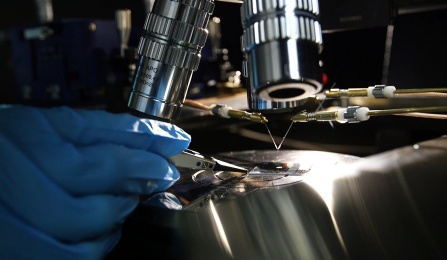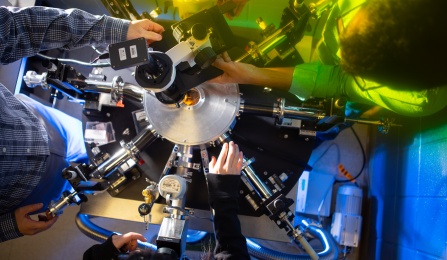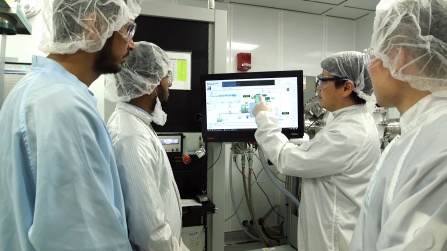Our Research
Making possibilities realities
Our research portfolio is highly interdisciplinary and pushes the boundaries of traditional classifications in materials science research to establish a new paradigm for materials design and innovation.

Energy and the Environment
Advancing accelerated discovery, modeling, characterization and nanofabrication of materials for energy storage and conversion for renewable energy and carbon neutral technologies.

Health and Medicine
Specialized research in high resolution imaging, time-resolved spectroscopy and property measurements for molecular scale materials characterization, and research directed towards instrumentation development and sensor design.

Materials Informatics
Advancing the tools of applied mathematics, statistics, machine learning, machine vision and information science, into experimental and computational materials science.

Microelectronics and Manufacturing
Research in the field of computing, multiscale modeling, and simulation of structure-property relationships in hard and soft materials.
Biology with X-ray Free Electron Lasers (BioXFEL) is a former Science and Technology Center established by the National Science Foundation. BioXFEL represented a new paradigm for materials science research. For the first time, data sciences, physics, materials and chemistry of soft matter converged to enable scientists to view the shape of a molecule as well as how it changes in real-time. The research can potentially transform a broad range of scientific fields focused on structural biology and drug development, and extend it to potential innovations in environmental technologies and development of new materials.
Center for Accelerated Innovation through Materials (AIM)
The Center for Accelerated Innovation through Materials is an interdisciplinary research program that leverages UB's expertise in artificial intelligence, materials science and advanced manufacturing to propel New York's transition to a clean energy economy through the development of sustainable infrastructure.
The Center for Advanced Semiconductor Technologies brings together researchers across UB to work collaboratively on cutting-edge research in microelectronics while training the next generation of leaders and engineers for the semiconductor industry. The center aims to position UB at the epicenter of Western New York's federal tech hub in advanced semiconductor manufacturing.
The Collaboratory for a Regenerative Economy (CoRE) is an integrated research, education and civic entrepreneurship initiative that links materials design with manufacturing technologies in coordination with the needs of industry and front-line communities. Our aim is to advance, in an accelerated manner, science-based solutions that enhance human and social capital.
Our program hosts scientists and engineers from companies for long term collaborations to pursue research tailored to industrial needs. By residing within the Materials Design and Innovation department, we provide an opportunity for industrial researchers to have an immersive experience with the data intensive research developed here.
Our department provides a comprehensive set of computational and laboratory facilities for faculty, students and researchers. These unique labs serve as focal points for creating a shared and cooperative research environment for promoting interdisciplinary research among diverse research groups.
